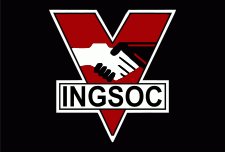- Ingsoc
-
"The Party" 
Appears in Nineteen Eighty-Four Leader Big Brother Notable members O'Brien
Emmanuel Goldstein (Later betrayed Ingsoc)Political ideology Oligarchical Collectivism, Big Brotherism Political position Syncretic Colours {{{colours}}} Slogan(s) "War is Peace; Freedom is Slavery; Ignorance is Strength."
"Who controls the past controls the future; who controls the present controls the past."
"Big Brother is Watching You."See also
Fictional political parties
Politics in fictionIngsoc (Newspeak for "English Socialism") is the political ideology of the totalitarian government of Oceania in George Orwell's dystopian science fiction novel Nineteen Eighty-Four.
Contents
Fictionalised origin of Ingsoc
Ingsoc (“English Socialism”) originated after the socialist party took over, but, because The Party continually rewrites history, it is impossible to establish the precise origin of English Socialism. Oceania originated from the union of the Americas with the British Empire. Big Brother and Emmanuel Goldstein led the Party’s socialist revolution, yet Goldstein and Big Brother became enemies.
As political philosophy
The Theory and Practice of Oligarchical Collectivism, by Emmanuel Goldstein, describes the Party’s ideology as an Oligarchical Collectivism, that “rejects and vilifies every principle for which the Socialist movement originally stood, and it does so in the name of Socialism”.
Big Brother personifies the Party, as the ubiquitous face constantly depicted in posters and the telescreen, thus, Big Brother is constantly watching. Ingsoc demands the complete submission – mental, moral and physical – of the people, and will torture to achieve it, (see Room 101). Ingsoc is a masterfully complex system of psychological control that compels confession to imagined crimes and the forgetting of rebellious thought in order to love Big Brother and The Party over oneself. The purpose of Ingsoc is political control, power per se; glibly, O'Brien explains to Smith:
“ The German Nazis and the Russian Communists came very close to us in their methods, but they never had the courage to recognize their own motives. They pretended, perhaps they even believed, that they had seized power unwillingly and for a limited time, and that just round the corner there lay a paradise where human beings would be free and equal. We are not like that. We know that no one ever seizes power with the intention of relinquishing it. Power is not a means, it is an end. One does not establish a dictatorship in order to safeguard a revolution; one makes the revolution in order to establish the dictatorship. The object of persecution is persecution. The object of torture is torture. The object of power is power. ” As metaphysical Pseudophilosophy
Metaphysically, Ingsoc posits that all knowledge rests in the collective mind of the Party; reality is what the Party says, the justification for its historical revisionism.[citation needed] With doublethink, the people believe what they otherwise know is false; in believing the revised (new) past, the new past is what was, hence "he who controls the past controls the future, and he who controls the present controls the past".[citation needed]
In the third part of Nineteen Eighty-Four, pure Ingsoc's thematic references to solipsism imply that the universe exists only in the mind.[citation needed] (Compare Externism.) The Ministry of Love (MiniLuv), via brainwashing and torture, and the Ministry of Truth (MiniTrue), with propaganda, ensure that perpetual loyalty to the Party is instilled to the mind of each Oceanian.[citation needed] The person exists only as part of the collective, hence, for the collective, nothing exists beyond the goodness of the Party and the evil of other nations and the Party's power.[citation needed]
Ingsoc’s social class system
In the year 1984, Ingsoc divides Oceanian society into three social classes, the Inner Party, the Outer Party, and the Proles:
- The Inner Party make policy, affect decisions, and govern; they are known as “The Party”. One of their upper-class privileges is (temporarily) shutting off their telescreens, for time alone. They live in spacious, comfortable homes, have good food and drink, personal servants, and speedy transportation. No Outer Party member or Prole may enter an Inner party neighbourhood without a good pretext.
- The Outer Party work the state’s administrative jobs; they are the middle class, whose “members are allowed no vices other than cigarettes and Victory Gin”, and who are the citizens most spied upon, via telescreens and surveillance. This is because, according to history, the middle class is the most dangerous; they are the ones to incite revolution, the one thing The Party does not want. They live in rundown neighbourhoods, use crowded subways as transportation, have poorer food and drink, and are denied sex for any other purpose than having children within marriage, and are expected to look at it as a duty, rather than pleasure.
- The Proles are the lower class of workers . They live in the poorest conditions. The Party keeps them happy and sedates them with alcohol, gambling, sport, sexual promiscuity, and prolefeed (Fabricated books, pornography). They are not constantly watched by The Party. A few agents of the Thought Police mark down and eliminate any individuals deemed capable of becoming dangerous and spread false rumours. Proletariat are 85 percent of Oceania’s populace.
Although the social classes of Oceania interact little, the protagonist, Winston Smith, attends an evening at the cinema, where proles and members of the Party view the same film programme; he patronises a proletarian pub without attracting notice (he thinks); and visits the flat of Inner Party man O'Brien, on pretext of borrowing the newest edition of the Newspeak dictionary. Ingsoc’s propaganda proclaims its egalitarianism, yet the Proles and (some) members of the Outer Party are hideously exploited and live in poverty, while the ruling élite, the Inner Party, work little and live well and comfortably; yet consumer goods are more scarce and expensive than under capitalism. It is suggested that this is not a result of a deficit of actual produce, but rather, a surplus: This surplus is more than taken up by ever-present warfare between Oceania, Eurasia and Eastasia. If the Party chose, all its people could live in luxury, but they instead choose to lower the quality of living.
Other political ideologies in Nineteen Eighty-four
Eurasia and Eastasia are the other two ideologically-formed and -ruled superstates that resemble Oceania. Neo-Bolshevism is the ideology of Eurasia, Soviet-conquered Europe. Death Worship (Obliteration of the Self) is the Chinese name for the ideology of Eastasia. The ruling oligarchies of the three superstates are aware that their ideologies are philosophically indistinguishable, a fact kept from, and denied by, their populaces via doublethink. Said denial, practised in each state, and the mutual vilification of the enemy state, permits perpetual war among them. Without said war, the lower classes would have no focus for the hatred of, and triumph over, the enemy, with which their Inner parties dominate them.
How Ingsoc gained control of the United Kingdom, the Irish Free State, the British Empire, and the Americas, in a historically-short period (nominally 30 years, although it is entirely possible that more time has passed and the Party has covered over this fact as well) is not established. In his book, Goldstein (although this is only a nom-de-plume) says that Oceania was created "with the absorption of... ...the British Empire by the United States". However, as Goldstein's book itself may have been created by the Party, it may be subject to the same historical revisionism as the Party's own propaganda, and so a highly unreliable source of information for every person living in Oceania.
See also
- George Orwell's Nineteen Eighty-Four, Chapter 1
- Thoughtcrime
- Newspeak
External links
- NORSOC, the Norwegian phalang of Ingsoc
- Flag-Burning: a Detriment to the Oceanian Way, a satire by Alexander S. Peak
- Students for an Orwellian Society
- Flags of Ingsoc and Neo-Bolshevism at Flags of the World
Nineteen Eighty-Four by George Orwell Characters Places Classes Ministries Concepts Ingsoc · Newspeak (wordlist) · Doublethink · Goodthink · Crimestop · Two + two = five · Thoughtcrime · Thought Police · Telescreen · Memory hole · The Theory and Practice of Oligarchical Collectivism · Two Minutes Hate · Hate week · Prolefeed · Prolesec · UnpersonAdaptations Influence Categories:- Nineteen Eighty-Four
- Fictional political parties
- Fictional governments
- Fictional philosophies
Wikimedia Foundation. 2010.

